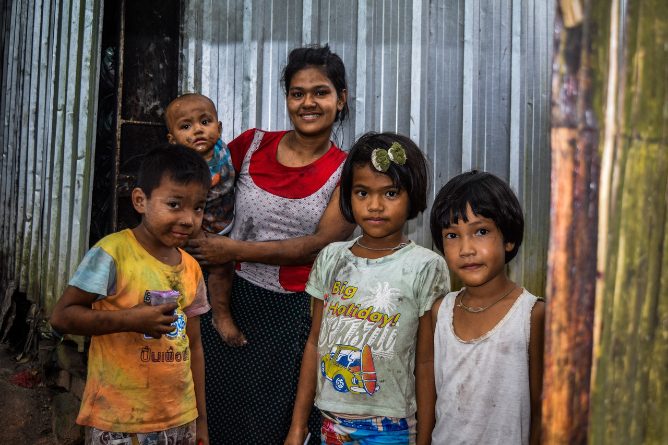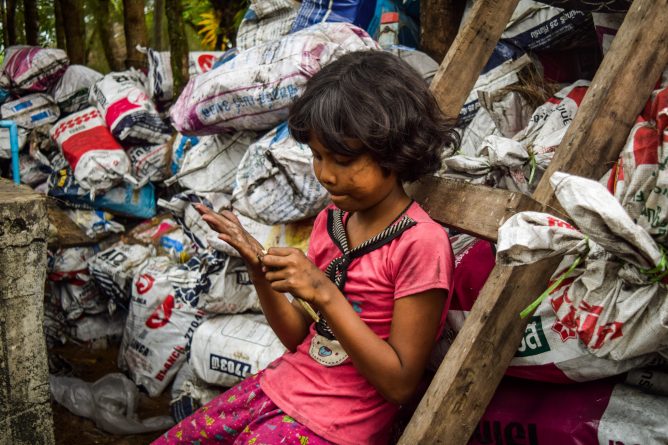
Charcoal Factory Children are examples of some of the most vulnerable Burmese Migrant Children not in any education system.
On August 24, 2019, 32 Burmese Migrant Teachers were arrested and deported from a Migrant Learning Centre in Ranong. This has caused an education crisis for the Burmese Migrant Community for the last 3 months with 3,000 children no longer in the education system.
This event has been called the ‘Ranong Raid’ by local media, and has captured NGO’s and Human Rights Advocates attention within Thailand.
At one level this education Crisis has now grown into a Catastrophe because the latest ‘crisis’ is on top of the sad reality that up to 80% of Migrant children are already ‘Out of School’ and 85% of Migrant Children normally leave education around 12 years of age.
While meetings continue, we are very mindful of the daily distress of parents and children who cannot send their children to school, who have to take their children to the fish and charcoal factories, the markets, and their various workplaces, which are often dangerous and not suitable for children.
Children are now locked up in homes for the day or roam the streets, they seek to play internet games at computer shops or sit at home all day feeling sad about their lost opportunities. Some parents and employers have requested us to please allow children to come to the Marist Centre as a ‘safe place’ for their children while they go to work.

Students in the Burmese Migrant Secondary Education Programme in Marist Asia Foundation are allowed to continue their education. 4 Years Secondary Education brings much brighter futures for Burmese Migrant Children.
The current challenge is that we are no longer allowed Burmese teachers to teach in the classrooms. Only Thai teachers are allowed to ‘teach’ while the current education and documentation challenge for Burmese Migrant Teachers and Students is unravelled.
While there have many meetings at both the local levels of Ministry of Education and among Migrant Learning Centres, and also meetings with United Nations IOM, UNESCO, UNICEF, Save The Children, World Vision, Help without Frontiers and other NGO’s, there has been little real progress made for the children.
While children sit at home or on the streets, one of the key debates in the background is between sending migrant children to Thai Schools; the ‘security’ and ‘sustainability’ argument. Or allowing Migrant Learning Centres to exist to serve the more flexible needs of migrant communities whose needs are to learn their own Burmese language and have an education pathway that allows them to return back to Myanmar and continue education; the ‘Myanmar education’ and ‘Burmese Parents Return Home’ argument.
This debate focusses us on the role and vital place of ‘Migrant Learning Centres’ in the context of providing flexible education for Burmese Migrant Children. For the past 15-20 years they have been allowed to operate, yet the Ranong Raid has now questioned their legality under Thai Law.
The current challenge is to find a solution so that our Burmese teachers are properly documented and allowed to return to the classrooms, Learning Centres are registered under Thai Law, and children are able to return to education.
Some 160 Burmese parents have chosen to send their children to some of the local Thai schools, and while they have been welcomed, this situation has revealed the lack of preparedness for teachers who can communicate in Burmese, a suitable curriculum for children who do not have the necessary Thai language skills, and the capacity to manage large numbers of migrant children.
This has caused many migrant parents to be upset with the education experience of their children and the loss of a suitable education pathway for their children.
Marist Asia Foundation has been committed to advocate for a genuine dialogue with both government and Burmese Learning Centres. We have hosted numerous meetings of both parties. We ourselves are currently taking steps to place our Burmese staff on Non Immigrant O Volunteer Visa’s as a way of returning them safely to the classroom, and we have begun the process for legal registration as a Learning Centre for our Education Programmes.
Yet the registration process is not clear for Burmese Migrant Learning Centres and their specific needs: Can they teach a flexible Thai and Myanmar Curriculum? Can they be approved to have ‘Burmese Teachers’? What criteria do they need to meet in terms of physical learning spaces and teacher qualifications?
Currently Marist Asia Foundation is the only Learning Centre open and providing education for Burmese Migrants in Ranong outside of the Royal Thai Government School system. We have a Memorandum of Understanding with the Thai Non Formal Education Department and use our Thai teachers and International Volunteer Teachers to continue our education programmes.
Marist Asia Foundation has also made a decision to welcome up to 60 more Burmese Migrant Teenagers early into the Burmese Migrant Secondary Education Programme with an entrance test on Dec 13. We will have an early start date for January 6 rather than May 15 to urgently bring back students into a daily education routine.
We sincerely hope that the Thai Government recognises the special and complex context of education on the Myanmar Thailand Border for Migrant communities. We have around 110 Migrant Learning Centres supporting over 16,000 vulnerable Burmese Migrant Children on the Thai Burma Border. And this is not including the estimated 200,000 Burmese Migrant Children who are not in any education system at all. The recognition and support of Burmese Migrant Learning Centres is vitally important to achieve ‘Education For All’ children.

The most vulnerable Burmese Migrant Children need to be kept at the centre of the discussion about sustainable education pathways.
Added to this complexity we have over 700 Burmese teachers unrecognised and extremely poorly paid. We need NGO’s, Education Stakeholders and both Thai and Myanmar Governments to dialogue together to reach an agreement about an effective and sustainable solution for the future of Burmese Migrant Children on the Thai Burma Border. We need to keep the education needs of the most vulnerable Burmese Migrant Children at the centre of the discussion so that any solution will truly bring them a brighter future.
We are thankful to so many supporters and organisations who have shown their concern and advocacy with us over the past 3 months. We continue to work together for the right to education for all our migrant children.
To understand more about the challenges and needs of Burmese Migrant Children you can download: Burmese Migrant Education Survey: Bridges – Participatory Action Research on the Future of Migrant Education in Thailand. You can download this report here
Marist Asia Foundation was proud to be a partner with other Migrant Education Organisations in this 2019 Research Project.